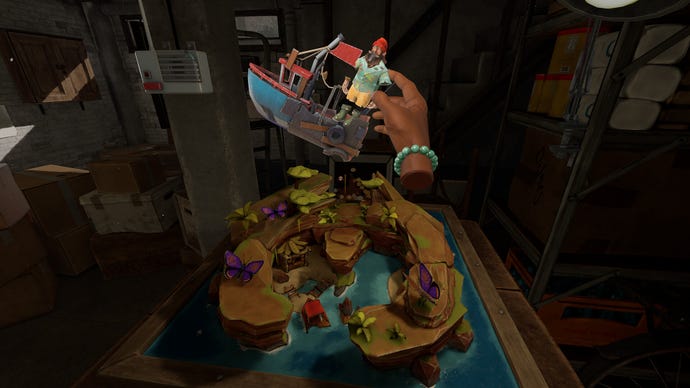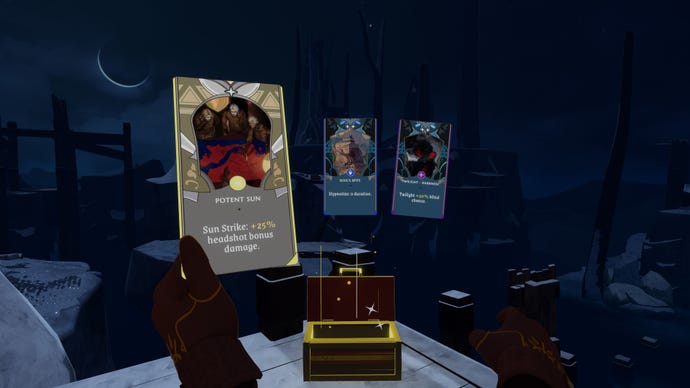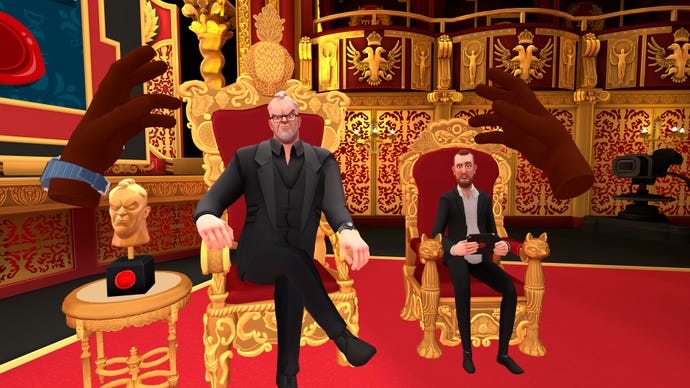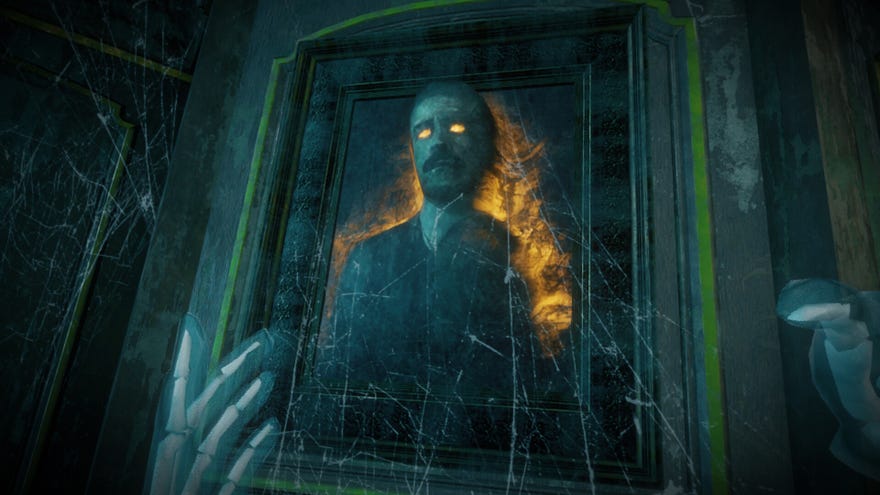Reality Bytes: Was 2023 a good year for VR?
Another year oVR. A new one just begun
Like a circus strongman's barbells, 2023's year in VR has been heavily weighted toward either end. The last twelve months were bookended with the launch of two excellent VR headsets (although only one is truly relevant to us PC gamers) and a whole bunch of great VR titles. The summer, however, was the quietest I've known for a long time, to the point where I ended up playing two VR minigolf games in the absence of anything better to do. Fortunately, the last few months have made up for it, providing enough fantastic VR games to feed us well into next year. So it's an unevenly weighted set of barbells, the kind that would give our moustachioed muscleman a slipped disk.
It's also been a year of interesting shifts. What was proclaimed the inevitable future of VR eighteen months ago – the Metaverse – is now dead in the water. Or at least, it's crawling weakly toward the ocean while our hero follows slightly behind, almost pitying the poor wretch, but still intent on drowning the malignant charlatan in the shallows. Meanwhile, the headsets that have dominated this year point to the growing platform-based nature of VR. Where a few years ago you only needed a headset and a PC to access the full suite of VR games, now you need the right headsets (and a PC). It's a trend that could have significant ramifications for PCVR in the future, although we're not there quite yet.
This was handily demonstrated at 2023's starting line by the launch of the PSVR2, Sony's follow-up to its previous headset that's designed to take advantage of the power of the PS5. Whereas the original PSVR was a bit too weedy to draw PCVR gamers away from the Rifts and the Vives (which sounds like a 1950s rock 'n' roll band) the PSVR2 is a cutting-edge headset, and brought some tasty exclusives to boot. Most notable were Horizon: Call of the Mountain, and an exclusive VR version of Resident Evil: Village. Although, the one that really sticks in the craw is the recently released VR version of Resident Evil 4 Remake. There are now two VR versions of Resident Evil 4, and you can't play either of them on PC. Rotters.


Meanwhile, Meta has spent the last few years buying up VR developers and signing either outright or timed exclusives its Quest headsets, meaning PCVR gamers have had to wait for some of its biggest hitters to land. And even then, some of them landed belly first, such as The Walking Dead: Saints And Sinners Chapter 2, a disappointing sequel to one of the best VR games around. There were some fun highlights from smaller developers in the spring, like the VR rogue-like The Light Brigade, and the charming perspective-based adventure Another Fisherman's Tale, but by late summer PCVR's cupboard was starting to look pretty bare.
It was rumoured that the reason for Meta's purchasing spree was so that those developers could make content for its Metaverse platform Horizon Worlds. The Metaverse dominated headlines last year and was destined to be the future of VR, if you believed Mark Zuckerberg's attempt to mimic the human emotion "enthusiasm". But the prospects for Horizon seemed flimsy from the start, and while Horizon Worlds is still theoretically in development, with Meta still pouring billions of dollars into it, the Metaverse has had its lunch thoroughly eaten by this year's technological fad, AI. As noted by the Verge, at this year's Meta Connect, Horizon Worlds received significantly less attention than Meta's AI initiatives, like a virtual assistant that can be integrated into chats across the company's messaging platforms. Oh well, at least everyone in Horizon Worlds has legs now.
Yet while Meta's vision for the Metaverse remains more watery than American tea, the company's still right at the forefront of VR headset design. In October, Meta launched the Meta Quest 3, which offers a substantial hardware upgrade from the Quest, alongside improved passthrough and mixed reality capabilities. The higher price and the lack of decent launch titles put me on the fence about whether it was worth the upgrade, but now it has a slew of games like Assassin's Creed Nexus, Samba Di Amigo: Party Central, Lego Bricktales, and Asgard's Wrath 2, it's a much more viable proposition.
Indeed, VR gaming has saved all the good stuff for the last three months. Alongside the Quest 3's slightly-after-launch titles, we've seen PCVR releases for Arizona Sunshine 2, Five Nights at Freddy's: Help Wanted 2 (which, like it or not, is a massive VR game), and the wonderful remake of ye-olde spooky puzzler the 7th Guest. If you own a Quest 2 or 3, you'll have access to nearly all of this because of Quest Link, making it one hell of a Christmas list for VR fans.
In short, 2023 has gone from being a pretty dry affair in VR land, to a bit of a bumper year right at the death. But the quality of your harvest depends heavily on which headset you've got, and the big question going forward is how much further the existing VR platforms are likely to drift apart. Right now, if you own a Quest headset, then you can access both the Quest exclusive library, and anything PCVR via Quest Link and Air Link. But will that remain the case? Meta has been pushing to make the Quest its own platform for years now. At what point does the Quest sever its connection with the PC entirely?
I think this may well happen eventually, but it's unlikely in the short term. Alongside its baseline audience, the Quest also has a huge user base on Steam. In fact, according to Steam's own hardware survey, it's by far the most popular PCVR headset, accounting for 40% of VR users between June and November 2023 (the Valve Index, by comparison, is the second most popular at 19%.) Letting the Quest access Steam gives the headset substantially more functionality, and there's no logical reason why Meta would want to stop that provided it can still sell exclusives on its own store.

And while Valve has its own headset it wants to sell, it also seems to understand the importance of Meta's continuing presence in the PCVR scene. Earlier this month, Valve partnered with Meta to update its Steam Link application to stream to Quest 2 and 3, a sort of reverse system to Quest Link and Air Link. As well as providing further PCVR functionality for Quest, it points to a continuing overlap between Meta headsets and PCVR.
As for what else the future holds, the short answer is: more headsets and more games. It's likely we'll see Apple's Vision Pro next year, possibly as early as January. Apple's headset is unlikely to have much relevance in these here parts, but it'll be interesting to see the response to it nonetheless. More significant is Valve's mysterious "Deckard" project, purportedly some kind of follow-up to the Valve Index. There are no firm details about Deckard, although some cryptic word uttered to James by Valve designer Lawrence Yang hinted it might take inspiration from Valve's work on the Steam Deck. "Just like Steam Deck is learning a bunch of stuff from controllers and VR, future products will continue to learn from everything we've done with Steam Deck." My money's on a Valve equivalent of the Quest, a standalone, inside-out tracking headset that can connect wirelessly to your PC (which, incidentally, Steam Link would be ideal for).
But let's close out 2023 with a quick glance at what we'll be playing next year. Titles on the cards for 2024 include Bulletstorm VR, the cyberpunk detective sim Low-Fi, and the giant-smashing adventure Behemoth, from the creators of Saints And Sinners. But by far the most exciting VR prospect for next year is Taskmaster VR. Getting chewed out by a virtual Greg Davies for playing VR Jenga badly? That alone is worth spend £500+ on some fancy goggles for your face.









